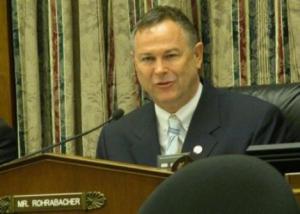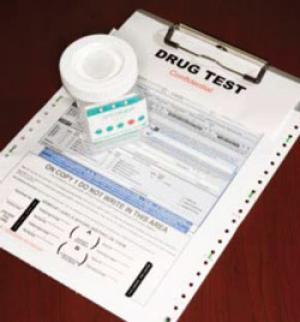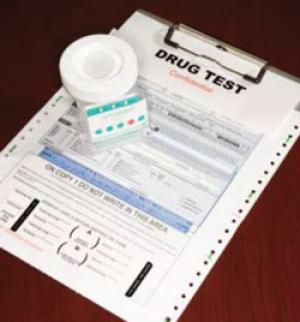A bipartisan group of House members have introduced a bill that would exempt states that have passed medical marijuana or marijuana legalization law from federal marijuana law enforcement.
A recently leadked DEA memo suggested that the feds couldn't crack the encryption on Apples's iMessage communications system. There's both more and less to it than meets the eye.
StoptheDrugWar.org needs your support to continue our work during the most important time in drug reform we've ever seen. We have gifts to send you too, with donations of $15 or more.
A federal appeals court has upheld the DEA's decision to not allow UMass-Amherst Professor Lyle Craker to grow marijuana for medicinal research purposes, capping a 12-year odyssey.
More DEA raids in Los Angeles, federal prison bureaucrats ignore a Michigan medical marijuana prisoner's medical needs, and there is lots of action in state legislatures.
A new poll shows strong public support for marijuana law reform among voters in the nation's capitol.
In what could be the opening shot in the 2014 California gubernatorial race, Lt. Gov. Gavin Newsom came out strong for marijuana legalization and against the war on drugs Saturday.
The Vermont House has approved marijuana decriminalization. It still has to get through the state Senate.
Bills that aim to impose drug testing on people seeking public benefits are moving in Arkansas, North Carolina, and Texas.
A "reasonable suspicion" public benefits drug testing bill has been signed into law in Kansas.
There's something rotten in the Salt Lake Valley and maybe in Middle Tennessee, too. Meanwhile, an Arkansas cop heads to prison for protecting dope loads and a Mississippi narc gets nailed for his pill habit.
The International Drug Policy Reform Conference is a biennial event that brings together people from around the world who believe that the war on drugs is doing more harm than good.
Interns are making an important difference fighting the good fight with us at StoptheDrugWar.org.
A bi-partisan group of US representatives led by Rep. Dana Rohrabacher (R-CA) Friday introduced legislation that would end the enforcement of federal marijuana laws in states that have either legalized it or adopted medical marijuana laws. That would bring 18 medical marijuana states and two legalization states -- Colorado and Washington -- out from under the shadow of the Controlled Substances Act when it comes to marijuana law reform.

Dana Rohrabacher
The bill is
H.R. 1523, the Respect State Marijuana Laws Act. It was not yet available online as of the original press time, but is now.
"This bipartisan bill represents a common-sense approach that establishes federal government respect for all states' marijuana laws," said Rohrabacher. "It does so by keeping the federal government out of the business of criminalizing marijuana activities in states that don't want it to be criminal."
Joining Rohrabacher as cosponsors of the bill were Reps. Justin Amash (R-MI), Earl Blumenauer (D-OR), Steve Cohen (D-TN), Jared Polis (D-CO), and Don Young (R-AK).
That brings to at least five the number of marijuana reform bills introduced in the 113th Congress, six if you count an industrial hemp bill. Three of those bills deal with medical marijuana, one with the ability of states to tax marijuana commerce, and one would end federal marijuana prohibition.
Reps. Polis, Blumenauer, Rohrabacher, and others also introduced that latter bill, House Bill 499, the Ending Federal Marijuana Prohibition Act, H.R. 499, which would set up a federal regulatory process -- similar to the one for alcohol -- for states that decide to legalize. Senate Judiciary Chairman Patrick Leahy (D-VT) has said he will hold hearings to examine Colorado and Washington’s new marijuana laws and explore potential federal reforms.
Marijuana law reform efforts in the Congress are being propelled not only by the continuing spread of medical marijuana laws and the impressive victories in Colorado and Washington -- each state saw 55% of voters approve legalization -- but also by ever-mounting evidence that public opinion nationwide is swinging in favor of legalization, and against federal interference in states undertaking marijuana law reforms.
A Pew poll released earlier this month had support for marijuana legalization at 52%, the highest ever for a Pew poll and the first time a Pew poll showed majority support for legalization. Five other recent opinion polls have shown support for legalization hovering at the tipping point, with two of them just under 50%, one at 50%, one at 54%, and one at 57%.
That same Pew poll also found considerable skepticism about enforcing the marijuana laws, with 72% agreeing that "government efforts to enforce marijuana laws cost more than they are worth" and 60% saying that the federal government should not try to enforce marijuana laws in states where it is legal.
"The people have spoken and members of Congress are taking action," said Bill Piper, director of national affairs for the Drug Policy Alliance. "This bill takes conservative principles and applies them to marijuana policy; in terms of the national debate it’s potentially a game-changer."
"This bill is a win for federalism and a win for public safety," said Neill Franklin, a former Maryland narcotics detective and now executive director of Law Enforcement Against Prohibition. "In a time of bitter partisanship, it is quite telling that both Republicans and Democrats are calling for respect for the reform of marijuana laws. Polls show this is a winning issue for politicians, and change is inevitable. We applaud those legislators who, rather than trying to impede this progress, stand with the vast majority of Americans who believe these laws should be respected."
"Marijuana prohibition is on its last legs because most Americans no longer support it," said Steve Fox, national political director for the Marijuana Policy Project. "This legislation presents a perfect opportunity for members to embrace the notion that states should be able to devise systems for regulating marijuana without their citizens having to worry about breaking federal law. If a state chooses to take marijuana sales away from cartels and the criminal market and put them in the hands of legitimate, tax-paying businesses, it should be able to do so without federal interference."
"We've reached a tipping point," said Jasmine Tyler, deputy director of national affairs for the Drug Policy Alliance, "and it is time Congress acknowledge what voters, law enforcement, and state officials have been telling us for years: the feds should stop wasting money interfering when the states are more than capable of regulating marijuana effectively."
Even though this and the other federal marijuana reform bills have been introduced with bipartisan support, their future in the Republican-dominated House this session is murky at best. Some key committee chairs, such as Rep. Bob Goodlatte (R-VA), head of the House Judiciary Committee, are very hostile to any reform efforts. But the pressure is mounting.
back to top
special to Drug War Chronicle by veteran investigative crime journalist Clarence Walker, [email protected]
When the tech world news web site CNET published excerpts of a leaked DEA memo explaining how, during an investigation, the agency was unable to access the messages of drug dealers using the Apple iMessage system built into a Verizon cell phone, it ignited a media frenzy. "It is impossible to intercept iMessages between two Apple devices," even with a court order approved by a judge, DEA complained.
The DEA's warning, marked "law enforcement sensitive," was the most detailed example yet of the technological obstacles law enforcement faces when attempting to conduct
court-authorized surveillance on non-traditional forms of communication. Federal law enforcers have coined the catchy phrase "Going Dark" to illustrate the problem.
News stories and tech blogs nationwide highlighted the effectiveness of Apple's encryption protection from privacy invaders, particularly law enforcement. (See, for example, stories here and here.) Amidst the frenzy, what went little noted was that no one's private messages held by Apple's iMessage or any other cell phone service are actually immune from federal government snooping. Under the Stored Communications Act (SCA), if the DEA wants access to someone's messaging communications, all it has to do is get a warrant to review those messages.
Why most media accounts neglected to mention this basic fact is uncertain, but the failure to do so not only misled readers into believing their iMessage communications were secure from government spying, it also fed into and reinforced a narrative being constructed by federal law enforcement agencies -- that rapid advances in telecommunications technologies are leaving the government in danger of "Going Dark" when it comes to its ability to surveil its citizens, and something needs to be done to fix the "problem."
"Apple iMessage users should be aware that regardless of what they heard last week, their messages can be easily obtained by law enforcement pursuant to a warrant under the Electronic Communication Act [ECPA]," said Alan Butler, an in-house attorney with the Electronic Privacy Information Center (EPIC). "The ECPA provides in Title 111, commonly referred to as the Stored Communication Act, that a government entity may require the disclosure of electronic communications held by a provider electronic storage," Butler told the Chronicle by email. Even though the messages are encrypted by the phone company as they are sent by iMessage, Apple can decrypt messages and hand them over to law enforcement with a warrant!"
"Nothing about the DEA memo says anything about trying to crack
iMessage,"
Cato Institute analyst Julian Sanchez told the Chronicle in an email. "All it really says is that an ordinary wiretap on a
cellphone's text messages isn't going to pick up
iMessages, which is a no brainer because
iMessages go over the Internet and not over a cell carrier."
The case that inspired the DEA memo centers around a drug investigation in Texas back in February where it was unable to intercept iMessages even though a federal judge had issued a court order approving the DEA's interception of the suspects' discussions about drug deals. Although the Federal Wiretap Act allows real-time surveillance of a device or computer, the DEA discovered in the February case that most records obtained from Verizon -- the carrier of the suspect's device -- were incomplete.
Cell phone surveillance is a key tool for law enforcement in monitoring criminal activity. The New York Times reported last June that federal, state, and local officials nationwide had requested assorted cell phone data 1.3 million times in the previous year. But iMessages can be sent through iPhones, iPads, and even Macs running the OS platform with the capability to bypass the text messaging services of a cell phone carrier. Apple revealed in January that it sees over 2 billion messages sent each day from a half-billion iOS and Mac devices that uses the iMessage to keep private conversations and text messages secure from snooping.
When iMessage was launched in 2011, company executives boasted about its "secure end-to-end" encryption, and some critics say the leaking of the DEA memo is a clever scheme by the feds to help convince lawmakers to mandate that all communication systems, including social media and internet messaging systems have a back-door mechanism to allow government access to the data.
Cato's Sanchez explained why he was leery of the DEA memo and the motives for its leaking.

EPIC attorney Alan Butler
"If this leak came from law enforcement, and that's mostly who would have access to this memo, I wonder why someone would leak it," he said. "One reason might be to support the larger 'Going Dark' campaign by the Department of Justice. Another reason might be the hope that drug dealers will mistakenly assume
iMessages are safe and get lazy. Those are two possibilities worth thinking about."
The DEA also complained "that iMessages between two Apple devices are considered encrypted communication and cannot be intercepted regardless of the cell phone service provider," even though in the same memo, it conceded that "sometimes the messages can be intercepted depending where the intercept is placed."
Was the DEA memo leak part of an ongoing campaign to revamp the federal laws governing surveillance of electronic communications? That's hard to prove, but showing that there is such a campaign is less difficult.
In February testimony to the House Judiciary Committee's Subcommittee on Crime, Terrorism, and Homeland Security, FBI General Counsel Valerie Caproni coined the term "Going Dark" to describe what she called federal law enforcement's rapidly diminishing ability to monitor high-tech communications products as technologies advanced over the past 10 to 15 years. Caproni singled out "social-networking sites, web-based email and peer-to-peer communications."
Other federal officials have been making similar noises.
"The FBI simply can't keep up with criminals taking advantage of online communication to hide evidence of their actions," FBI lawyer Andrew Weissman said last month during a meeting with American Bar Association.
The FBI and other federal law enforcers claim there is a growing gap between the legal authority of federal and other law enforcement agencies to intercept electronic communications pursuant to court order or direct warrant under the Communications Assistance Law Enforcement Act (CALEA) and their ability to actually do so. And they want new legislation to fix that.
Passed in 1994, CALEA law initially ordered phone companies to create a mechanism to have their systems conform to a wiretap in real-time surveillance. The Federal Communications Commission (FCC) extended CALEA in 2005 to apply to broadband providers, such as universities and Internet service providers, but messaging and social media services, such as Google Talk, Skype, Myspace, Yahoo and Facebook, as well as encrypted devices like Blackberry and Apple communications are not covered.
The FBI argues that "Going Dark" is a real and threatening possibility, with increased risk to national security and public safety. And the FCC has joined forces with the FBI by considering updating CALEA to require that digital products equipped with video or voice chats over the Internet, including Skype and Google Box Live, to rejigger their systems to allow the feds to monitor criminal activity as it happens in real time.
"We have noticed a massive upstick in the amount of FCC-CALEA inquiries within the last year, most of which are intended to address 'Going Dark' issues," said Chris Canter, a lead compliance counsel at Marashlian & Donahue , a law firm specializing in CALEA law. "This generally means that the FCC is laying the groundwork for regulatory action," he told the Chronicle.
"If we applied the FBI's logic to the cell phone carriers, it would state that every individual phone should be designed with built-in bugs," the Electronic Frontier Foundation said in a statement on CALEA. "Consumers would simply have to trust law enforcement or the phone companies not to activate those bugs without just cause."
EFF filed a Freedom of Information Act (FOIA) request with the FBI and other federal law enforcement agencies showing how the feds might try to justify forcing high-tech services to rewire their systems for expanded wiretapping purposes. The FOIA requested "information concerning the difficulties that the FBI and DOJ has encountered in conducting authorized electronic surveillance."
But so far, the Department of Justice has withheld the bulk of relevant information on the topic, provoking San Francisco US District Court Judge Richard Seeborg to order the feds to turn over the records. No court date scheduled for the feds to comply.
While law enforcement is calling for legislative changes to aid its work, critics insist that even if Congress refuses to pass laws to tackle the "Going Dark" problem, investigators can still obtain a special warrant allowing them to sneak into private residences and businesses to install a keystroke-logging system onto a computer or other devices to record passwords to unlock data they need to make a case.
The DEA adopted this same technique in the Texas case and another case where suspected drug dealers used PGP and the encrypted Web-email service identified in court records as Hushmail.com. Investigators can also send a malware to gain control of a targeted cell phone to extract the text messages, or as a last resort, obtain a warrant to seize the physical device and perform a traditional forensic analysis.
"New technologies frequently create uncertainty and the law is slow to adapt while leaving us to fight over how much surveillance we can tolerate in a free society," noted EPIC attorney Butler. "No one has quite figured out how to strike that balance in every case. However, the Fourth Amendment requires that our persons, houses, papers, and effects be protected from unreasonable search and seizures."
The battle between the imperatives of law enforcement and the privacy rights of Americans is never definitively won. Instead, it is better viewed as a never-ending series of skirmishes. And the contested terrain of this particular skirmish is your iPad.
back to top
Dear friend,
StoptheDrugWar.org needs your help to continue our programs -- like this newsletter,
Drug War Chronicle -- during this most important time in the cause there has ever been.
Click here for some examples of how activists around the world rely on
Drug War Chronicle in their work.
As our thanks for your support, we continue our full set of membership offers, some of them available with donations of $15 or greater to our organization. We also continue to offer, with donations of $35 or more, "
Marijuana Legalization: What Everyone Needs to Know," authors of which were
recently hired to consult with the state of Washington on implementing legalization there.
The newest item is a pair of reports that highlight the US and international legal landscapes as legalization becomes a mainstream issue. (We'll send you both for the $15.) Though the text of each report can be found online, for $15 or more you can hold the nice printed copies -- the history in the making -- in your hands. They are:
- "On the Limits of Federal Supremacy: When States Relax (or Abandon) Marijuana Bans," a Cato Institute Policy Analysis by Vanderbilt law professor Robert Mikos, explores the limits in federal law and resources for enforcing marijuana prohibition in states that have legalized.
- "Governing the Global Drug Wars," a special report by London School of Economics IDEAS, details the history of the global prohibition regime; the obstacles it poses to nations seeking to explore legalization and other reforms, and efforts by nations and agencies to transform the system into one respecting public health and human rights.
We are also pleased to continue offering the following items (while supplies last), now also with donations of $15 or more:
- Emperor of Hemp DVD, about the life and work of Jack Herer (memorial tribute edition)
- StoptheDrugWar.org strobe light
- StoptheDrugWar.org stamp and ink pad
- StoptheDrugWar.org mouse pad
Though we offer many items for $15, I hope you will consider making a larger donation if you are able, or supplementing your initial gift with a monthly one. If the gifts are not important to you, I hope you'll consider sending a donation that's just for our work.
Donations can be tax-deductible, supporting our educational work, or non-deductible, supporting our lobbying work. (Note that selecting any gift items reduces the amount of your donation that is deductible -- which with a smaller gift amount can be most of it.) They can be made online on our web site by credit card or PayPal, or sent by mail to P.O. Box 18402, Washington, DC 20036. If you are donating by check, please make it payable to DRCNet Foundation (if tax-deductible) or Drug Reform Coordination Network (if not deductible).
If you wish to donate stock, the information to give your brokerage is Ameritrade, (800) 669-3900), DTC #0188, and account number 781926492 for tax-deductible gifts or 864663500 for non-deductible gifts -- please make sure to contact us if donating in this way.
Thank you for standing with us to stop the drug war's cruelties and meet the opportunity this time offers to make a brighter future. As recent events show: Time, and the truth, are on our side!
Sincerely,

David Borden, Executive Director
StoptheDrugWar.org
Washington, DC
http://stopthedrugwar.org
back to top
The US First Circuit Court of Appeals in Boston Monday sided with the Drug Enforcement Administration (DEA) in rejecting University of Massachusetts-Amherst scientist Dr. Lyle Craker's appeal of the agency's decision to deny him a license to grow medical marijuana for research purposes.

Professor Lyle Craker (maps.org)
sought to break the federal government's monopoly on the production of marijuana for research purposes. Because of hostility to research on the possible benefits of marijuana in the federal drug control and research bureaucracies, the federal monopoly on marijuana for research purposes created a bottleneck, blocking potential valuable research efforts.
The decision in Craker v. DEA caps a 12-year odyssey through federal regulatory purgatory for Craker and the Multidisciplinary Association for Psychedelic Studies, which had backed the UMass-Amherst scientist's bid to develop a source of marijuana independent of that produced under the auspices of NIDA.
"After such a long struggle, I'm disappointed that the Court failed to recognize the need for an independent source of plant material for use in research on the medical uses of marijuana," said Prof. Craker. "In doing so, they have failed the American people, especially those for whom marijuana as a medicine could help."
Craker first applied for a license from the DEA in 2001; it took the agency three years to initially deny his request. In 2007, the DEA's own administrative law judge recommended that the agency grant his application, but two years later, then DEA Deputy Administrator (and current Adminstrator) Michele Leonhart rejected that recommendation. Craker sought a formal reconsideration, which Leonhart denied in 2011.
Craker then appealed to the First Circuit, with oral arguments taking place in May 2012. In its decision Monday, the First Circuit upheld Leonhart's denial. In so doing, it dismissed Craker's claims that the DEA had changed the rules in the middle of the game and that the supply of marijuana from the NIDA facility was inadequate and uncompetitive. Leonhart's interpretation of the Controlled Substances Act was permissible and her findings were "reasonable and supported by the evidence," the court held.
"This ruling will result in sick people continuing to be denied the medicine they desperately need, and which 18 states and the District of Columbia recognize as legitimate," said Allen Hopper, criminal justice and drug policy director for the ACLU of California and one of the lawyers representing Prof. Craker. "The Obama administration must stop blocking the research necessary to take marijuana through the FDA approval process."
back to top
More DEA raids in Los Angeles, federal prison bureaucrats ignore a Michigan medical marijuana prisoner's medical needs, federal drug bureaucrats prevail in a medical marijuana research case, and there is lots of action in state legislatures, including a Wednesday afternoon victory in the Illinois House. Let's get to it:
NationalOn Monday, a federal appeals court rejected Prof. Lyle Craker's appeal to overturn a DEA decision to not allow him to grow medical marijuana for research purposes.The appeals court sided with the DEA, finding its decision to maintain the federal marijuana cultivation monopoly was reasonable and in line with the Controlled Substances Act. Craker first sought approval in 2001.
California
On Monday, a hearing on a Lake County lawsuit challenging the county's cultivation ordinance was postponed when the judge hearing the case recused himself. Judge Richard Martin recused himself because his son is running for sheriff against Sheriff Frank Rivero, who is a defendant in the case. As a result, the lawsuit against the county and its sheriff will be sent to Lake County Superior Court Presiding Judge Stephen Hedstrom for reassignment. Lake County resident Donald Merill is suing over the Board of Supervisors' decision last summer to approve an ordinance limiting the number of pot plants allowed in outdoor cultivation, banning commercial cultivation of medical marijuana and prohibiting growing on vacant lands in the unincorporated areas of the county. Now, a case management conference set for next week has been pushed back until late August, too late for this year's outdoor growing season.
On Tuesday, supporters of a Los Angeles dispensary initiative kicked off their campaign with a city hall press conference. Proposition D is one of three dispensary initiatives going before city voters on May 21. The measure would cap the number of dispensaries at 135, as would Proposition E, whose backers have switched to supporting Prop D. A third initiative, Proposition F, has no caps on dispensaries, but imposes other restrictions. Both Props D and F would impose a gross tax receipts of 2% on medical marijuana dispensary revenues.
Also on Tuesday, DEA and local law enforcement raided four Los Angeles area dispensaries. Hit were the Zen and Alternative Herbal Health Services dispensaries on Santa Monica Boulevard in West Hollywood, La Brea Compassionate Caregivers in Los Angeles, and Marina Caregivers in Marina del Rey. Law enforcement also executed search warrants at seven other locations and arrested three people. Those arrested are accused of selling marijuana outside of California and various other offenses.
Illinois
On Tuesday, nearly 250 doctors signed on to support medical marijuana legislation pending at the state house. Several of them, along with patients, spoke at a Chicago press conference one day before a vote on House Bill 1 was expected in the House. The bill would create a pilot medical marijuana program, including a dispensary system.
On Wednesday, the bill passed the House on a 61-57 vote. It now goes to the Senate.
Michigan
Late last week, the federal Bureau of Prisons refused to house an ailing medical marijuana patient at one of its medical facilities even though he is a kidney-pancreas transplant candidate, suffers coronary artery disease, and requires a strict medication regime. Jerry Duval, 53, must report to federal prison on June 11 and must serve his sentences at a federal correctional facility in Ohio. His sentencing judge had recommended that he be "placed in a Federal Medical Center or other facility deemed to be appropriate in consideration of the Defendant's medical needs." Last August, Montana medical marijuana prisoner Richard Flor, 68, died in federal prison after his medical conditions were given short shrift.
Nevada
Last Thursday, a medical marijuana dispensary bill won a Senate committee vote. Senate Bill 374 was approved by the Senate Judiciary Committee on a unanimous vote. The bill now goes to the Senate Finance Committee. Because the bill includes fees, it must win two-thirds approval to pass the Senate.
On Saturday, the state's first medical marijuana school opened. The Cannabis Career Institute launched its Budtender School with a workshop for about 40 students on Saturday in Henderson. The school will teach all aspects of the medical marijuana business, including how to grow marijuana legally and bake it into brownies, cookies and cakes. The institute has held similar workshops in other cities across the US, and more than 1,500 people hold certificates from it.
New Hampshire
Last Thursday, medical marijuana legislation got a hearing in a key Senate committee. The bill, House Bill 573, was heard in the Senate Health, Education, and Human Services Committee. Opponents suggested that a clinical study be done, but supporters retorted that such suggestions were merely a way to delay the bill. A similar measure has already passed the House. While Gov. Maggie Hassan (D) has said she would support a tightly regulated program, she has expressed concern about a home-grow option.
New York
On Tuesday, a medical marijuana bill passed the Assembly Health Committee on a 21-4 vote. The bill, Assembly Bill 6357, would allow patients suffering from severe debilitating or life-threatening conditions to use medical marijuana. A practitioner who is licensed to prescribe controlled substances would certify that a patient has a severe debilitating or life-threatening condition that should be treated with the medical use of marijuana. Certifying and dispensing medical marijuana would be included in the I-STOP prescription monitoring system for controlled substances enacted in 2012.
Also on Tuesday, Gov. Andrew Cuomo (D) said he still opposes medical marijuana. "I do not support medical marijuana. I understand the pros and cons. I understand the argument," Cuomo said. "We are looking at it, but at this point, I don't support medical marijuana. I understand the benefits, the risks. How do you construct a system that really is that tightly controlled that you don’t have dissemination beyond the directed population?"
North Carolina
Last Friday, Rep. Kelly Alexander introduced a medical marijuana study bill. The bill, House Bill 941, would require a legislative research commission to study medical marijuana-related issues. Earlier this session, Alexander had introduced a medical marijuana bill, but that was killed by legislators who complained they were getting too much feedback from constituents.
Oregon
Last Friday, it was learned that the federal government had forced the state to release medical marijuana patient records. The Oregon Public Health Division, which keeps tabs on medical marijuana card holders, has handed over an undisclosed number of patient records as the result of a federal search warrant. The DEA executed the warrant and seized Oregon Medical Marijuana Program records in an investigation into illegal drug activity. The name and number of patients information pulled is still unknown because the investigation is ongoing and more records could be subpoenaed. Patients and activists are not pleased.
Rhode Island
Last Thursday, medical marijuana supporters protested proposed restrictions on caregivers at a rally at the state house. More than two dozen people showed up to oppose amendments to the state's law that would reduce the number of plants that a caregiver could grow from 24 to 12 and allow a patient to grow a maximum of 6 plants. Patients can currently grow twice that number. The caregivers and patients also criticized amendments that would require the growers to notify city or town zoning officials about their plans to grow marijuana.
back to top

District of Columbia map
Activists planning possible Washington, DC, marijuana reform efforts got some good news this week. A
Public Policy Polling survey released Wednesday found that three-quarters of DC voters support decriminalizing marijuana possession, two-thirds (67%) think law enforcement resources focused on marijuana should be used elsewhere, and nearly two-thirds (63%) said they would support ballot measures similar to those in Colorado and Washington state, where voters legalized marijuana last November.
DC voters weren't just interested in lessening marijuana law enforcement. A solid majority (54%) said drug use should be treated as a public health issue and people should no longer be arrested and locked up for possession of a small amount of any drug for personal use.
DC-based activists have been meeting about plans to push pot law reforms. The first stop is the city council, but it the council balks, there are also contingency plans for a possible ballot initiative. In interviews earlier this year, activists said they were waiting for polling results before deciding on a course of action. Now they have them.

Adam Eidinger holding "Free Bryan Epis" sign at protest of then drug czar John Walters, 2002 (drugwar.com)
"As a 20-year DC resident, I know scores of people who have been humiliated with an arrest and have even spent time in jail for possessing small quantities of marijuana," said longtime District activist and spokesman for Dr.
Bronner's Natural Soaps Adam
Eidinger. "This new poll confirms that there is little support for laws that criminalize marijuana consumers in the District and they are due for repeal. We hope it inspires the Council to craft meaningful marijuana policy reform legislation, but in either case a change in the law appears to be inevitable."
"District voters, like most Americans, think it is time for a new, more sensible approach to marijuana policy," said Steve Fox of the DC-based Marijuana Policy Project. "People should not be subjected to life-altering criminal penalties simply for using a substance that is objectively less harmful than alcohol. Harsh criminal penalties should be reserved for serious criminals, and our law enforcement resources should be reserved for addressing serious crimes."
"DC voters clearly want to end the failed war on drugs," said Bill Piper, DC-based national affairs director for the Drug Policy Alliance. "Decriminalizing marijuana is a no-brainer, but the Council should do more. There is an opportunity to make a clean break from the past and treat drug use as a health issue instead of a criminal justice issue. More access to treatment and health services. No more putting people in jail."
The ball is in the DC City Council's court, but if elected representatives fail to act, the threat of direct democracy via the initiative process looms.
back to top
At the California Democratic Party convention in Sacramento Saturday, Lt. Gov. Gavin Newsom called for marijuana legalization and described the war on drugs as "an abject failure." (Watch the speech here.)

Gavin Newsom
The famously
well-coiffed former San Francisco mayor is one of the key contenders for the Democratic Party gubernatorial nomination in 2014 -- if
Gov. Jerry Brown (D) decides not to run again. The other leading contender is state Attorney General
Kamala Harris, who did not broach the topic in her convention address.
"It's time to decriminalize, tax, and regulate marijuana," Newsom said to raucous cheers and applause. "In 2011 alone in this country, three quarters of a million people in the United States were arrested for marijuana law violations, 87% of them for simple possession. And listen to me closely on this -- African-American children are ten times more likely to get arrested for drug crimes than their white counterparts even though white children are more likely to abuse drugs."
"You can't make this up," Newsom said. "We send a higher percentage of African American males to prison and jail in this country than we send to colleges and universities in California. After 42 years of failure, I think it's time we concede that if we continue to do what we've done, we'll continue to get what we've got. I think you and we deserve better. It's about standing up on principle, having the courage of our convictions, about saying publicly all too often what we say privately."
The lieutenant governor's speech wasn't all high seriousness. Jokingly referring to his role as acting governor while Brown is on an overseas trip, he said, "I'm thrilled to be here… on the sixth day of the Newsom administration," he said. "This is the right time and the appropriate time to reflect on our cornucopia of landmark accomplishments over these magical six days." Among those was the creation of hundreds of new jobs, "notably in the now-booming hair gel industry," he said, patting his hair.
"All of these wonderful achievements will one day be studied by scholars at the Newsom Acting Governor Library, currently being constructed in the back of a medical marijuana dispensary in the Haight-Ashbury," he said to laughter and applause. "I'm looking forward to it as well," Newsom said, smiling.
back to top
The Vermont House of Representatives Friday approved a bill that would decriminalize the possession of small amounts of marijuana. The bill passed on a vote of 98-44.
The bill now moves to the Senate. It is supported by state Attorney General William
Sorrell and Public Safety Commissioner Keith Flynn, both of whom testified for it in the House.
Gov. Peter
Shumlin (D) has also expressed support for decriminalization.
Introduced by Rep. Christopher Pearson (P-Burlington) with a tri-partisan group of 38 cosponsors,
House Bill 200 would decriminalize the possession of up to an ounce of pot, making it only a
ticketable offense, like a traffic citation. Minors under 21 would additionally have to undergo substance abuse screening.
Under current Vermont law, possession of up to two ounces is a misdemeanor punishable by up to six months in jail, and up to two years in jail if it's not a first offense.
"Vermont is another step closer to adopting a more sensible approach to marijuana policy," said Matt Simon, a legislative analyst for the
Marijuana Policy Project. "The support demonstrated by members of the House reflects that of the state's top law enforcement officials and the voters."
Marijuana is decriminalized in 17 states, including Vermont's neighbors, Connecticut, Maine, Massachusetts, and New York.
back to top
Bills that would require recipients of public benefits such as welfare or unemployment benefits to submit to drug testing have advanced in three states. On Monday, an unemployment drug testing bill passed the Arkansas Senate. On Tuesday, a welfare drug testing bill won a Senate committee vote in North Carolina. And on Wednesday, a welfare drug testing bill passed the Texas Senate.
The Arkansas bill,
Senate Bill 38, would require random,
suspicionless drug testing of people receiving unemployment benefits. Those seeking unemployment would have to sign a waiver to allow for random drug testing, and they would be ineligible for benefits if they refused to sign or failed the drug test.
It passed the Republican-led Senate on a 25-5 vote and now goes to the House.
"Arkansas law states that you have to be adequately seeking employment, and by that you have to pass a drug test since so many employers require drug tests," said bill sponsor Sen. Jeremy Hutchinson (R-District 33), who said 80% of employers in the state require drug tests. His bill was "more of an enforcement mechanism than anything else," he added.
The bill is being opposed by the ACLU of Arkansas, which is threatening to fight it if it becomes law. But even if the bill gets through the House, Gov. Mike Beebe (D) has signaled it might not survive his veto pen.
"We have concerns about whether the bill will put us in violation of the federal unemployment laws administered by the US Department of Labor," Beebe spokesman Matt DeCample told Reuters. "There are also continued concerns as to whether the cost of implementing such a program would produce any real savings in offset."
The North Carolina bill, Senate Bill 594, sponsored by Sen. Jim Davis (R-Macon), would require applicants for Temporary Assistance for Needy Families (TANF) to undergo mandatory suspicionless drug tests at their expense. Applicants would be reimbursed if they tested negative, but denied benefits if they tested positive -- until they have entered and paid for drug treatment.
Things got testy before the measure passed the Senate Judiciary Committee Tuesday.
"If you have money to buy drugs, you have money to buy food, you have money to support your family," Davis said. "You don't deserve public assistance." Non-drug users "will gladly" pay for drug tests because they know they will be reimbursed, he said.
"If they're already there because they need food stamps, where are they going to come up with that money? They're scraping the bottom," Sen. Ellie Kinnaird (D-Orange) shot back.
Bill Rowe of the North Carolina Justice Center told lawmakers that studies showed drug use is no more common among welfare recipients than the general public, and that similar laws in Florida and Michigan had been found unconstitutional, sparking an angry reaction from one lawmaker.
"Our Fourth Amendment doesn't allow suspicionless testing of people," Rowe said. "There's no decision that says this is okay."
"You're okay with (drug users) getting federal dollars if they've had a doobie and get the munchies and need more food stamps?" challenged Sen. Tommy Tucker (R-Union). "Sit down."
Noting that the bill "mostly affects poor people and a significant number of them people of color," Sen. Angela Bryant (D-Rocky Mount) said its sponsors were letting their "prejudice" show. "There's a lot of people getting government money," she said. "Let's not start with poor people on this. Let's start with ourselves. When you run for election, you should have to take a drug test. If we give a scholarship, you should have to take a drug test."
"I really reject the notion of injecting race into this thing," Davis shot back. "I'm sick and tired of it. This is not a racial bill."
The bill was approved on party lines and now goes to the Senate Health Committee.
The Texas bill, Senate Bill 11, would require TANF applicants to undergo a drug use assessment, and if there is "good cause to suspect" drug use, they must then undergo a drug test. A positive drug test would result in a denial of benefits for six months, with a second positive drug test resulting in a denial of benefits for a year, although they could be restored after six months if drug treatment is completed.
People who had prior drug convictions or previous positive drug test results would face mandatory drug testing.
"Taxpayer dollars shouldn't be used to subsidize a person's drug habit," said bill sponsor Sen. Jane Nelson (R-Flower Mound).
"Welfare should never subsidize the irresponsible choices of otherwise capable people who instead elect to stay at home, play video games, and get high with their friends," Lt. Gov. David Dewhurst (R) said.
The bill passed the Senate on a 31-0 vote after Nelson agreed to language sought by Democrats that ensured that children of parents who tested positive wouldn't lose their benefits. It now goes to the House.
back to top
Kansas Gov. Sam Brownback (R) Tuesday signed into law a bill that requires applicants for welfare and unemployment benefits to undergo drug testing if there is "reasonable suspicion" they are using drugs. People who test positive would have to undergo drug treatment and job training at state expense before becoming eligible for cash assistance.
According to
Senate Bill 149, "reasonable suspicion" may be derived from "applicant's or recipient's demeanor, missed appointments and arrest or other police records, previous employment or application for employment in an occupation or industry that regularly conducts drug screening, termination from previous employment due to use of a controlled substance or controlled substance analog or prior drug screening records of the applicant or recipient indicating use of a controlled substance or controlled substance analog."
It is not clear why having worked or applied for a job in "an occupation or industry that regularly conducts drug screening" creates "reasonable suspicion" that someone is using drugs, but that's what the law says.
Gov. Brownback signed the bill during a Tuesday afternoon, saying the state had an obligation to its residents to help them break their addictions and improve their lives through treatment and job training.
"Drug addiction is a scourge in Kansas. This is a horrific thing that hits so many people," Brownback said. "What this effort is about is an attempt to get ahead of it, and instead of ignoring the problem to start treating the problem."
Critics of the bill, including the American Civil Liberties Union state chapter, argued that public benefits recipients don't use drugs any more frequently than anyone else, that such laws perpetuate existing stigmas, and that they unnecessarily invade privacy. But those arguments did not sway the legislature or the governor.
back to top
There's something rotten in the Salt Lake Valley and maybe in East Tennessee, too. Meanwhile, an Arkansas cop heads to prison for protecting dope loads and a Mississippi narc gets nailed for his pill habit. Let's get to it:
In West Valley City, Utah,
an internal audit released Friday has found that narcotics officers stole money and other items from vehicles they seized and may also have taken drugs and money confiscated during arrests. The audit identified six "areas of concern," including improper evidence handling, missing cash and drugs, officers taking cash from vehicles, officers taking trophies or souvenirs, and the improper use of confidential informants. This is only the latest blow against a department plagued with corruption allegations. Earlier this week, 69 more drug cases were dismissed, bringing the total to well over a hundred state and federal cases dismissed because of questions about the credibility of West Valley narcs. The drug squad has been disbanded, and two of its members are on administrative leave. Those two, Shaun Cowley and Kevin Salmon, were also involved in the fatal shooting of alleged drug user Danielle Willard last November, an event as yet unexplained, and one that led to the unraveling of the scandal within the department.
In Erwin, Tennessee, the Unicoi County sheriff has requested an investigation of the department's drug funds and drug evidence after one of his narcotics officers resigned upon testing positive for drugs. Sheriff Mike Hensley has asked the local district attorney and the Tennessee Bureau of Investigation to conduct an investigation. Narc Matthew McNally resigned last Friday, two days after taking the drug test. He said he had a new job.
In Oxford, Mississippi, the former head of the Oxford Police drug squad pleaded guilty Tuesday to federal charges of "doctor shopping." Former head narc Searn Lynch was arrested on charges he obtained prescriptions from at least 17 different doctors. He was fired after the November arrest. He will be sentenced at a later date.
In Little Rock, Arkansas, a former Helena-West Helena police officer was sentenced last Thursday to 2 ½ years in prison for her role in the Operation Delta Blues federal corruption investigation. Marlene Kalb was convicted of taking cash to escort a felon she thought was transporting cocaine through the area. She was convicted extortion and attempt to possess a controlled substance. Although she faced up to 20 years on each charge, the judge said her sentence complied with federal sentencing guidelines.
back to top

vigil outside Albuquerque Convention Center, 2009 drug policy reform conference
is a biennial event that brings together people from around the world who believe that the war on drugs is doing more harm than good. It brings together over 1,000 attendees representing 30 different countries.
StoptheDrugWar.org is a partner in this year's conference, which will take place October 23-26 in Denver, Colorado, as officials craft the state's implementation plan for legal marijuana under Amendment 64. Attendees will have the opportunity to spend three days interacting with people committed to finding alternatives to the war on drugs -- marijuana legalization and many other issues in drug policy -- while participating in sessions given by leading experts from around the world.
Here are what some attendees had to say about the 2011 conference:
- "The International Drug Reform Conference was, by far, one of the most eye opening experiences of my life... It felt as if I were at the epicenter of the most conscious people on the planet."
- "Every workshop that I attended had excellent presenters and panelists. I was extremely pleased to once again attend the 2011 Reform Conference. It was more diverse than ever and very inclusive of issues that I support. See you in Denver!"
- "The Drug Policy Alliance conference is an educational opportunity that every responsible individual should experience -- regardless of your position on the issues."
- "Every two years I look forward to the International Drug Policy Reform Conference, where I know I'll get a chance to hear from, and speak with some of the brightest minds in the drug policy reform movement."
- "If you think the drug war has failed our country and harmed countries like Mexico and you want to do something about it, this is the conference to be at."
Visit http://www.reformconference.org for further information.
back to top
StoptheDrugWar.org works for an end to drug prohibition worldwide and an end to the "drug war" in its current form. We believe that much of the harm commonly attributed to "drugs" is really the result of placing drugs in a criminal environment. We believe the global drug war has fueled violence, civil instability, and public health crises; and that the currently prevalent arrest- and punishment-based policies toward drugs are unjust. Please visit our web site, and please read more about us.
We are seeking Legislative, Writing/Research, Web Content, Information Technology, and Admin/Finance interns (potentially still this semester, depending on your interests, definitely for the summer). Communications may also be applicable to current organizational projects. Preference will be given to applicants with some demonstrated experience the relevant fields, and to applicants in the Washington, DC area. However, consideration will also be given to enthusiasm for drug policy and criminal justice reform.
Note that StoptheDrugWar.org internships are unpaid. We reimburse for metro fare. Please also note that the organization has functioned as a "virtual office" environment since spring 2011. Staff will meet with interns on a regular basis during the semester, and can be available to meet and work together on a weekly or even daily basis, but this will happen in places like coffee shops or campuses.
In order to help our interns forge ties with the larger community, we are organizing intern networking social hours with other organizations in drug policy and justice reform. We are also arranging tours of the DC courts and possibly jail, and public health and other programs that have bearing on drug policy. Interns are also welcome to join us at the frequent legislative working group meetings that take place on our issues here in Washington.
Please send cover letter, resume, and any supporting material you'd like to include, to StoptheDrugWar.org executive director David Borden, at [email protected]. (We recommend using a return receipt to ensure your emails are not blocked by any filters.) Thank you, and we look forward to hearing from you. Information on our specific intern positions follows below.
Legislative
Legislative interns will help, and in some cases play a leading role, on the following organizational projects:- Bill and vote tracking, at the federal and state level, including write-ups for our web site's legislative center (possibly in collaboration with Writing interns);
- Creating action alerts on current legislation and other advocacy priorities, to be distributed through our web site and email list (possibly in collaboration with Writing and Web Content interns); and
- Coalition outreach to secure partners for organizational sign-on letters to Congress.
Interns may also join us at working group meetings on issues including but not limited to sentencing reform, drug policy including marijuana law reform; collateral consequences of criminal convictions; and reinvigorating the presidential clemency/pardon system. Spanish-language skills may be useful.
Writing/Research
Writing/Research interns will have the following opportunities:
- Assist Drug War Chronicle editor Phillip S. Smith with ongoing article collection and research for feature articles on our web site (which are frequently reprinted on major news sites such as alternet.org).
- Assist with research on special topics, the goal of which is the publication of special reports. Likely projects include but are not necessarily limited to follow-up research on US drug war killings (see our recent report here); procuring drug arrest data and possibly arrest reports from various jurisdictions for various months and years, to evaluate the results of recent policy reforms, particularly for marijuana.
- Bill and vote tracking, at the federal and state level, including write-ups for our web site's legislative center (possibly in collaboration with Legislative interns);
- Creating action alerts on current legislation and other advocacy priorities, to be distributed through our web site and email list (possibly in collaboration with Legislative interns);
- Updating an archive of SWAT raids and other paramilitarized policing activity that went wrong (possibly in collaboration with Web Content interns); and
- Assisting with updating or creating various special sections of our web site (possibly in collaboration with Web Content interns).
Interns with Spanish-language skills may be involved with reporting on the Mexican drug war.
Web Content
Web Content interns will assist with the following work:
- Daily link and other content postings;
- Development or maintenance of special sections of our web site (possibly in collaboration with Writing interns); and
- General social media work, including a number special social media projects.
We may also initiate an informal web video series, for which intern assistance would be invaluable, but this has not been decided yet.
Information Technology
IT interns will assist with the following projects:
- Backend web site programming, primarily involving streamlining of our donations processing system;
- Server migration to a "cloud" arrangement;
- Security including PCI compliance;
- Selection and set up of needed software and services; and
- Database-related projects.
Admin/Finance
Admin & Finance interns may assist with the following organizational needs, among others:
- Bookkeeping;
- Nonprofit accounting including intra-company allocations and 990 preparation;
- Budget & cash flow analysis;
- Membership administration;
- Database work.
Admin & finance interns will gain familiarity with a significant range of nonprofits' administrative activities, and depending on schedule may have the opportunity to sit in on portions of board discussions or meetings with advisors.
Communications
As noted above, communications skills are applicable to a number of facets of our work this semester, and communications majors are encouraged to apply. We have not listed communications as a separate internship this semester, because we have not decided whether to engage in specific outreach efforts to mainstream media this semester. Along with the possibility that we will do so, other work of relevance to communications can be found in our Legislative, Writing, and Web Content internships.
Thank you for considering an internship with our organization. We look forward to hearing from you.
back to top















